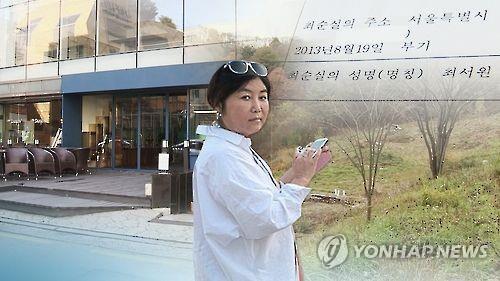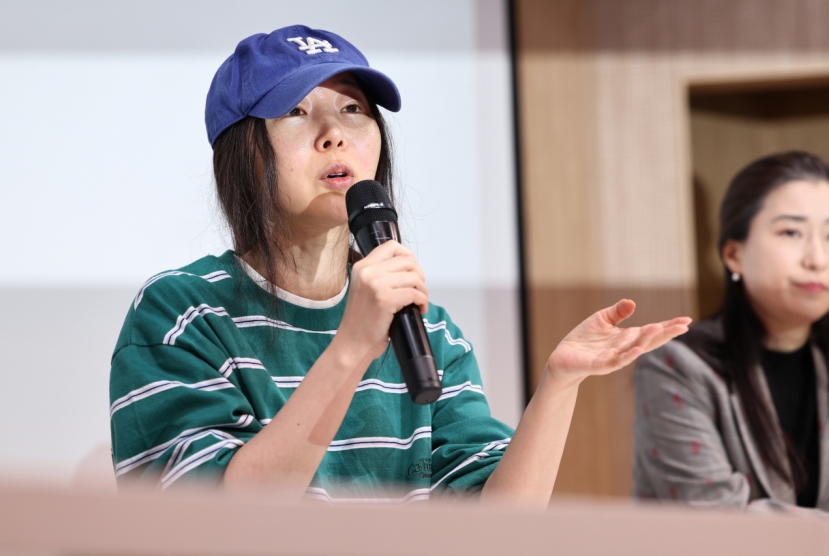Choi admits receiving presidential documents, denies other allegations
By 임정요Published : Oct. 27, 2016 - 10:41
Choi Soon-sil, a close confidante of President Park Geun-hye who is under suspicion for exercising influence on state affairs, admitted to receiving presidential documents but denied all other allegations, including claims she unlawfully raised funds for public foundations, a local news report showed Thursday.
Choi, known to be in Germany at present, confirmed in an interview with South Korea's daily Segye Times that she did some editing on speeches, but it was only to "help better convey Park's feelings" on certain issues.

The 60-year-old woman, who had known the president for some 40 years, said she wished to apologize to the president for the trouble the incident is causing and emphasized that Park is a "great figure who is totally dedicated to the country."
Choi is the fifth daughter of Park's late mentor Choi Tae-min, a leader of a questionable religious group who died in 1994.
Observers said Park built a friendship with the Choi family after her mother and then-first lady Yook Young-soo was assassinated in 1974.
Earlier this week, Park admitted that Choi "offered me personal comments" on her speeches and campaigns, adding that the woman in question had provided her with help when she was going through very hard times. After the death of her mother, Park's father, former President Park Chung-hee, was killed by his own spy chief in 1979.
"As I know well what is in Park's mind and heart, I helped her find the right words to express herself. I did not know the materials were confidential," Choi told the paper, adding that her involvement came out of a wish to lend assistance.
When asked when she received the presidential documents, Choi said she cannot clearly remember, but admitted getting e-mails after Park was elected in 2012.
On allegation she received printed materials or got them through tablet PCs, Choi said she only got them through e-mails.
"I do not have a tablet PC, let alone know how to use one. I think the report of the leaks came from someone else's device,"
Choi said. A local broadcaster broke the story after it retrieved data from an abandoned tablet PC at Choi old office in Seoul.
Choi then denied allegation she was involved in the Mir Foundation and the K-Sports Foundation. South Korean media have been citing claims she was deeply involved in the foundations which collected huge donations from conglomerates, and that the money was funneled to Choi.
"I can take poison and die here," Choi said, stressing she is innocent of the charges raised. "I am too exhausted and reporters have made us into criminals."
Choi said she came to Germany to "protect" her daughter, adding the two are being used as pawns in political intrigue.
Choi's daughter is also embroiled in speculations that she was unfairly accepted to Seoul-based Ewha Womans University. Some of the university's students argued that Choi's daughter received relatively higher grades compared to her actual achievements.
On prospects of her returning home Choi said her poor health prevented her from traveling at present.
"I am suffering from a nervous breakdown and I have been diagnosed with heart issues," Choi said. "If I recover, I will ask for forgiveness, and will accept punishment if I did anything wrong."
Justice Minister Kim Hyun-woong said the ministry is taking all necessary measures to bring Choi back home, adding it is also "considering" the suspension of Choi's passport.
"We have an obligation to keep information confidential in terms of judicial cooperation (with Germany)," Kim said. "Although we cannot provide details, we are working closely with out counterparts."
The minister also said the majority of legal experts do not consider Park as being subject to an investigation. When asked if there will be any search conducted on the presidential office, Kim added it will seek "appropriate" measures in line with the outcomes of the investigation.
South Korea's ruling and opposition parties continued to express concern over the mounting allegations.
Rep. Kim Moo-sung, the former head of the ruling Saenuri Party, who had a falling out with Park, said being sick is not an excuse to stay in Germany, adding she must promptly return home for investigation.
Rep. Ahn Cheol-soo, the former head of the minor People's Party who is considered a liberal presidential candidate, called for reducing the authority of the president, while suggesting a new prime minister should take the lead in normalizing state affairs.
Both the ruling and opposition parties already agreed to call for a special prosecutor to look into all allegations raised.
Amid the on-going allegation, Park's approval rate crashed.
According to the survey conducted by major pollster Real Meter, Park's approval rate came to 17.5 percent on Wednesday, marking the lowest rate since she took office.
More than 40 percent of the respondents asked for Park's impeachment or resignation, while 21.5 percent said there must be a personnel reshuffle at the presidential office.
Amid the mounting allegations, lawmakers supporting a constitutional revision said the discussion must be pushed forward.
They said the scandal should be considered a milestone as it proved the negative aspects of having a president with excessive authority.
"The Constitution must be changed so that we can alter the entire system related to state affairs to prevent another Choi scandal," Kim Moo-sung said.
"After South Korea adopted a single five-year term system, six presidents had relatives arrested, while five of them left their parties," Kim said. "As the winner takes everything in the current authoritative presidential system, there has been discord in every state affair, especially since failure by the opposition to challenge the president could make it hard to take the presidency in the next election."
Rep. Kim Boo-kyum of the Minjoo Party agreed that the scandal proves the weakness of the system, adding there must be a "revolutionary" revision to protect the people from those with political, economic and social power. (Yonhap)



![[Herald Interview] 'Amid aging population, Korea to invite more young professionals from overseas'](http://res.heraldm.com/phpwas/restmb_idxmake.php?idx=644&simg=/content/image/2024/04/24/20240424050844_0.jpg&u=20240424200058)















